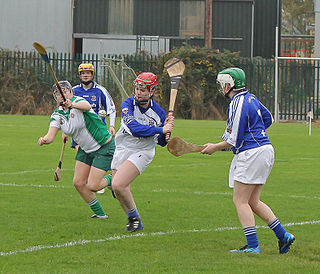
Camogie is an Irish stick-and-ball team sport played by women. Camogie is played by 100,000 women in Ireland and worldwide, largely among Irish communities.

The Rugby Championship is an international rugby union competition contested annually by Argentina, Australia, New Zealand, and South Africa. These are the four highest ranked national teams in the Southern Hemisphere, the Six Nations is a similar tournament in the Northern Hemisphere.

The National Provincial Championship (NPC) was renamed for the 2021 season to the Bunnings NPC as a result of a commercial sponsorship deal with Bunnings Warehouse. It is a professional rugby union competition for New Zealand provincial unions consisting of 14 teams, divided equally between the Premiership Division and the Championship Division. The NPC remains the second highest level of professional rugby union in New Zealand, after Super Rugby. The NPC's 11-week regular and finals season runs from two weeks after Super Rugby ends to the third week after Labour Day, with each team playing 10 games and having one week playing twice. Following the conclusion of the regular season, four teams from each division advance to their respective play-offs, a single-elimination tournament of semi-finals and final.

New Zealand Rugby (NZR) is the governing body of rugby union in New Zealand. It was founded in 1892 as the New Zealand Rugby Football Union (NZRFU), 12 years after the first provincial unions in New Zealand. In 1949 it became an affiliate to the International Rugby Football Board, now known as World Rugby, the governing body of rugby union for the world. It dropped the word "Football" from its name in 2006. The brand name New Zealand Rugby was adopted in 2013. Officially, it is an incorporated society with the name New Zealand Rugby Union Incorporated.

The All-Ireland Senior Football Championship (SFC) is the premier competition in Gaelic football. An annual tournament organised by the Gaelic Athletic Association (GAA), it is contested by the county teams in All-Ireland.
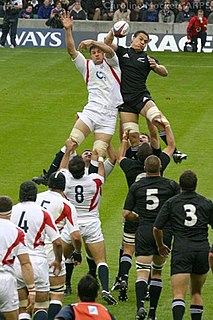
Rugby union is the unofficial national sport of New Zealand. The national team, the All Blacks, is currently ranked the second best international rugby team in the world, after South Africa. The sport has been known in New Zealand since 1870. The top domestic competitions are the semi-professional Mitre 10 Cup and amateur Heartland Championship, and above them Super Rugby, in which New Zealand has five franchises. The country co-hosted and won the first ever Rugby World Cup in 1987, and hosted and won the 2011 Rugby World Cup. They have won three World Cups, tied with South Africa, the most of any other country. They are also the current World Champions in 7s rugby for men and women.
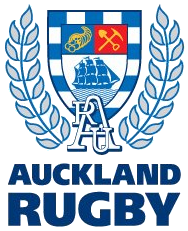
The Auckland Rugby Union are a New Zealand governing body of rugby union in the New Zealand province of Auckland. The ARU governs the running of the Auckland representative team which have won New Zealand's first-tier domestic competition, National Provincial Championship 17 times—more than any other team. Their most recent victory was the 2018 competition. Auckland also acts as a primary feeder to the Blues, who play in the Super Rugby competition.
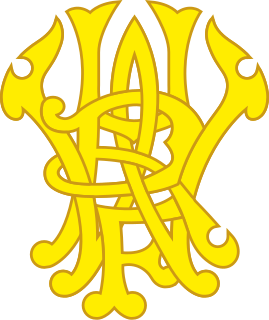
The Wellington Rugby Football Union are a New Zealand governing body of rugby union in the New Zealand province of Wellington Region. The main stadium is Sky Stadium which is located in Wellington. The union also represents the Wellington Lions, which is professional rugby union team who compete in the Mitre 10 Cup competition and contest for the Ranfurly Shield. Before 2006 the Lions competed in the National Provincial Championship.

The Heartland Championship competition, known for sponsorship reasons as the Bunnings Warehouse Heartland Championship, is a domestic rugby union competition in New Zealand. It was founded in 2006 as one of two successor competitions to the country's former domestic competition, the National Provincial Championship (NPC). The country's 27 provincial teams were split into two separate competitions. Thirteen of the original teams, plus one merged side created from two other teams, entered the new top-level professional competition, the Air New Zealand Cup. The remaining 12 sides entered the new Heartland Championship, whose teams contest two distinct trophies, both named after legendary New Zealand players:
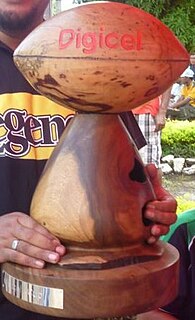
The Skipper Cup is the Fiji Rugby Union's national provincial rugby union championship. The competition runs from May to September and is contested between the country's top 12 provincial sides. At the end of the competition the top 4 teams qualify for the semi-finals, with the winners moving on to the final. The competition has been sponsored by the phone company Digicel since 2008. Prior to that the trophy was called the Sanyo Cup.

The Challenge Trophy is a national amateur soccer cup in Canada contested by the champions of individual provincial soccer competitions. It is one of the oldest soccer competitions in Canada, being held since 1913. It is run by the Canadian Soccer Association.
The Ontario Rugby Union (ORU) also known as Rugby Ontario is the provincial governing body for the sport of rugby union in the Canadian province of Ontario and a Provincial Union of Rugby Canada. Rugby Ontario governs various levels of rugby.

The 2008 Air New Zealand Cup was a provincial rugby union competition involving 14 teams from New Zealand. Matches started on Thursday 31 July 2008, and continued until the final on 25 October 2008.

The 2010 ITM Cup season was the fifth season since the competition reconstruction in 2006. For the ITM Cup competition it involved the top 14 provincial unions of New Zealand. The tournament was won by Canterbury, who defeated Waikato 33–13 in the competition final. For sponsorship reasons, the competition was known as the ITM Cup and it was currently the first season under the new sponsor. Including the defunct National Provincial Championship, this is the 34th season of New Zealand's premier domestic competition. The regular season matches took place from 29 July until 24 October – followed by the semi-finals that culminated in the final on 5 November.

The 2011 ITM Cup season was the sixth season since the competition reconstruction in 2006 and the first under the new Premiership and Championship format. For the ITM Cup competition it involved the top 14 provincial unions of New Zealand. The tournament was won by Canterbury, who defeated Waikato 12–3 in the competition final. For sponsorship reasons, the competition was known as the ITM Cup and it was currently the second season under the new sponsor. Including the defunct National Provincial Championship, this is the 35th season of New Zealand's premier domestic competition. The regular season matches took place from 14 July until 30 August – followed by the final on 3 September. It finished without semi-finals to allow more time for the 2011 Rugby World Cup to be held in September and October; in future non-World Cup years, the competition will extend into semi-finals.

The Gold Cup is the premier rugby union club competition in South Africa for non-university teams.
The Jubilee Trophy is the Canadian national championship for women's amateur soccer teams, first held in 1987. It is held concurrently to the national men's amateur Challenge Trophy.
The RFU Junior Vase is a rugby union national knockout cup competition in England run by the Rugby Football Union, which has been competed for since 1990. It is mostly contested by 1st XV teams at level 9 of the English rugby union system, although sides as low as level 12 or even outside the league system can sometimes enter. The competition is a national one, but split into regions until the national semi-finals with the final being held at Twickenham Stadium in London. Presently, the RFU Junior Vase is the fifth most important club cup competition in England, behind the Premiership Rugby Cup, RFU Championship Cup, RFU Intermediate Cup and RFU Senior Vase.
This page is based on this
Wikipedia article Text is available under the
CC BY-SA 4.0 license; additional terms may apply.
Images, videos and audio are available under their respective licenses.













